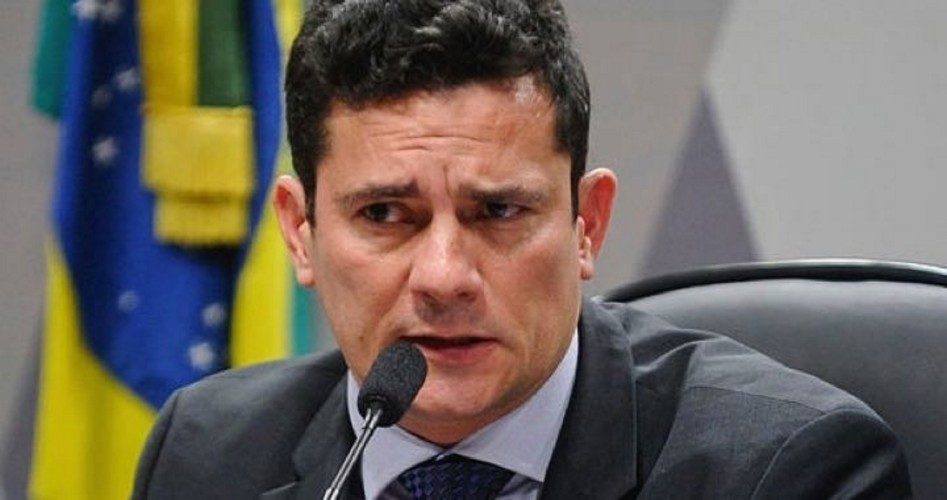
American journalist Glenn Greenwald — who became famous in 2013 for a series of reports in Britain’s Guardian newspaper based on classified documents provided by whistleblower Edward Snowden exposing the U.S. and British global surveillance programs — is now directing critical attention to Brazil’s justice minister, Sergio Moro. Greenwald now writes for and co-edits The Intercept, an online publication that he founded in 2013 with documentary filmmaker Laura Poitras (who collaborated on Snowden’s revelations with Greenwald) and investigative journalist Jeremy Scahill.
On June 9, The Intercept published a series of exposés that it said “created a major political earthquake in Brazil that has only grown and intensified throughout the week.”
Since the exposés appeared, President Jair Bolsonaro’s once highly respected justice minister, Sergio Moro, has received widespread calls to resign from the same large Brazilian media outlets that for years had supported him wholeheartedly. The Intercept report noted:
Even more grave, the improprieties revealed by our reporting have cast serious doubt on the validity of numerous guilty verdicts issued by Judge Moro and the anti-corruption task force, beginning — most importantly — with the conviction and imprisonment of former President Luiz Inacio “Lula” da Silva last year at exactly the time that he was the overwhelming the front-runner to win the presidency in 2018. That conviction by Judge Moro, which we now know was the by-product of highly improper and unethical conduct, is now scheduled to be reviewed by the Supreme Court as early as next week.
AFP on June 13 quoted Greenwald as saying that he has received “grotesque” threats after publishing the report accusing Moro of conspiring to keep Lula out of the 2018 presidential race. Moro’s investigation was known as “Car Wash.”
Lula is serving a reduced jail term of eight years and 10 months after being convicted of accepting a seaside apartment as a bribe for helping the OAS construction company get lucrative deals with Petrobras. A second conviction handed down in February resulted in a sentence of almost 13 years.
While, at this point, it is impossible for us either to confirm or dispute the reports that The Intercept has published accusing Moro of political corruption, one thing is certain: Even if these charges are confirmed, the “victim” of this unethical behavior — the Marxist-Leninist former President “Lula” da Silva — was himself placed in power by a corrupt network (the FSP) extending even beyond Brazil’s borders. The extent of this network’s reach was detailed in an article in The New American in 2017 by this magazine’s foreign correspondent, Alex Newman. Newman wrote:
The Foro de Sao Paulo (FSP), or the Sao Paulo Forum in English … was founded by murderous dictator Fidel Castro, Marxist-Leninist former Brazilian President Luiz Inacio “Lula” da Silva, the mass-murdering Sandanistas in Nicaragua, and Marxist terror groups very much including the FARC. Their plan, as official documents from the outfit have revealed, is to rebuild in Latin America what was “lost” in Eastern Europe — namely, communist totalitarianism.
The corruption charges against Moro are yet to be proved, but even if they are confirmed, there is no evidence that Bolsonaro was involved. Given the threat to the freedom of all Brazilians presented by Lula and his FSP allies, his elimination from the presidency might be compared to the coup that removed Salvador Allende from the presidency of Chile on the eve of his consolidation of power that would have resulted in a Marxist dictatorship.
Compared to the prospects of a communist dictatorship under Lula, any “crimes” that Moro may have committed might be regarded as misdemeanors. Those who cherish freedom in Brazil will hope that Greenwald — who performed a valuable service in helping Snowden expose threats to freedom in the U.S. government — will come to understand that Lula was a far greater threat in Brazil than is Moro.
Photo of Sergio Moro: CCJ – Comissão de Constituição, Justiça e Cidadania via Wikimedia
Related articles:
Brazil’s Former President Charged in Petrobras Scandal
Brazil’s Former President Lula to Stand Trial in Third Corruption Case
Trump and Brazil’s Bolsonaro Bond During White House Visit
Greenwald to Release Names of U.S. Citizens Targeted by NSA
Glenn Greenwald Nails David Frum’s Iraq War Explanations
The Case of Edward Snowden: Reason v. Rhetoric
Snowden Warns Israeli Audience About Risks of Surveillance
Snowden Slams U.S. NSA and British GCHQ for Uncontrolled Surveillance
Snowden’s Father, Lawyer, Challenge Obama’s Claims
Snowden Says NSA Targets Journalists Critical of Government
Report of Snowden Seeking Ties to KGB Vets False, Lawyer Says
U.S. Taxpayers Fund Takeover of Colombia by Marxist Terrorists



